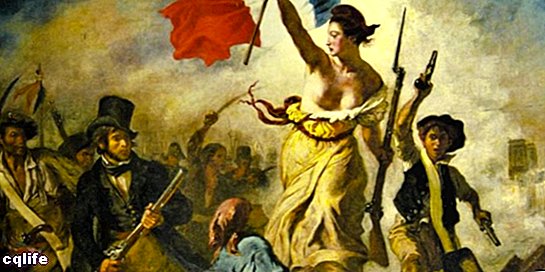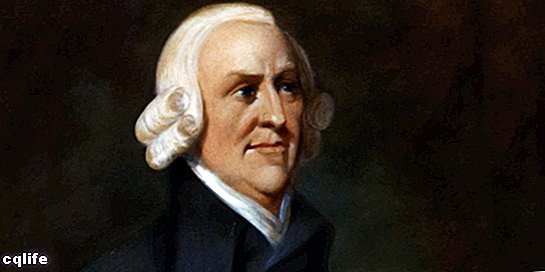- What is liberalism?
- Characteristics of liberalism
- Origin of liberalism
- Social and economic liberalism
- Representatives of liberalism
- Neoliberalism
We explain what liberalism is, its currents, origin and representatives. Also, social and economic liberalism.
John Locke is considered the father of classical Liberalism.What is liberalism?
Liberalism is the philosophical doctrine that prioritizes the protection and promotion of freedoms individual as the central problem that should address the political exercise.
Both politically, socially and economically, liberalism proposes that the raison d'être of the Condition lies in ensuring the equality before the law and the fair exercise of freedoms. At the same time, the State must have clear limits to its power, so that it does not constitute an impediment to free life.
More than one doctrine unified, however, liberalism actually encompasses a set of ways of thinking that share the defense of individual rights (such as the freedom of expression), economic freedom, secularism, private property, the democracy and the Rule of law.
It is a set of ideological forms typical of bourgeois society and the industrial era, so that its origins tend to be the same as those of the capitalism.
There are several historical liberal currents or those derived from liberalism, which are:
- Classical liberalism. Born of the bourgeoisie In the seventeenth and eighteenth century and its struggle against monarchical absolutism and aristocratic privileges, it defended at the time the non-interference of royal power in civil affairs, freedom of worship, political exercise and economic exercise. It was a movement typical of nascent capitalism, fundamental in the fall of the Old Regime and in the emergence of the Illustration, which was opposed from the 19th century to the interference of the State in economic affairs, defending individual freedoms at all costs.
- Socioliberalism. Also known as liberal-progressive, social capitalism or social market economy, it seeks a balance between the defense of individual freedoms and economic exercise, and the protection that the State can offer against unjust and excessive forms of the market, such as the monopolies and other forms of competence unfair, guaranteeing the welfare state.
- Minarchism. Supporter of the minimal State, in charge only of the territorial defense of the nation and the bra Justice and public order, this model proposes that the rest of the society it must be left in private hands. This term was coined in 1971 by the American Sam Konkin (1947-2003).
- Anarcho-capitalism. Also known as anarchism from free market or anarcoliberalism, proposes an organized society devoid of State, in which absolutely all goods and services come from free market competition.
Characteristics of liberalism
Fundamentally, liberalism is characterized by:
- Consider freedom as an inviolable element of civic life, in all its different aspects: freedom of worship, of the press, of association, of thought, etc., as long as the exercise of said freedoms does not contradict those of others. Such freedom must be sacred and the government he must not be able to violate her at will.
- Defend the principle of equality before the Law (rule of law), both in the political and social spheres, since only in this way will the individual be freely responsible for their actions.
- Defend the principle of private property as an inalienable right of the individual, protected by law against collectivist initiatives.
- Defend the existence of a secular state and a education lay, composed of powers autonomous and independent according to the republican model (executive, legislative, judicial), since the solution of dilemmas can always be found through the exercise of political dialogue.
- Generally propose the minimum interference of the government in the life of the citizen, and the minimum interference of the State in the conduct of the economy.
Origin of liberalism

Bourgeois revolutions harmonized with the values of liberalism.
The origin of liberalism dates back to seventeenth-century Britain, as heir to the empiricist and utilitarian philosophy that gave birth to the mercantilism, a school of thought that demanded State intervention in the economy, to guarantee the nation the conditions to generate wealth and compete with its neighbors.
However, state interference used to benefit the established classes and exert resistance to free enterprise, which went against the rise of the bourgeois middle classes, that is, merchants.
Thus, in the seventeenth and eighteenth centuries the Bourgeois Revolutions took place, which went against the interests of the aristocracy and the Old Regime, especially in France and England. Thus took place the English Civil Wars, the Glorious Revolution or the French Revolution from 1789.
All these conflicts cemented a new form of egalitarian, individualistic and libertarian thought, which spread throughout Europe. Thus, in some cases the fall of the monarchies was caused and in other cases they were forced to agree with the rest of the social and economic actors.
For this they had to give up a good part of their powers in exchange for avoiding being guillotined in a Revolution. This political transformation gave rise to classical Liberalism, and was vital in the rise of capitalist society.
Social and economic liberalism
Although both aspects coexist within the liberal philosophy, social and economic liberalism can be understood separately as follows:
- Social Liberalism. It has to do with the non-interference of the State in the private life of the citizens, nor in their social relationships, thus allowing freedom of worship, thought, association and the press to exist, as long as the laws are not violated or the freedoms of third parties are violated. Liberalism is in favor of the rule of law, that is, of equality before the law, and considers on the contrary that what happens in the intimate forum of civic life is the sole and exclusive responsibility of those involved, as long as it is not being committed. no crime.
- The Economic liberalism. On the other hand, it maintains the necessary independence of the mercantile and commercial relations of the citizens from the interference of the State, as long as, of course, this exercise does not constitute any violence against the freedoms of others. Thus, the taxes, regulations and government restrictions must be, if not eliminated, at least restricted to their minimum expression, to allow free competition to guide the market and productive labor in its own ways.
Representatives of liberalism

The main exponents of liberal thought, throughout history, were:
- John Locke (1632-1704). English philosopher and physician, belonging to the current of the empiricism English and considered the father of classical Liberalism, since he was the first to formulate a properly liberal philosophy, which enshrined the right to private property and the consent of the governed. His contributions to liberal theory and republicanism were notable.
- Immanuel Kant (1724-1804). German philosopher considered one of the great thinkers of the Modern age, representative of criticism and precursor of German idealism. Kant defended a liberal perspective of society, in which free will is key to a moral life. For Kant, individuals had to obey only those laws that they considered consistent with their legislative will, and these fundamental freedoms can only be alienated when the sovereign so decides, transferring it to the government on his behalf.
- Adam Smith (1723-1790). British economist and philosopher, he was one of the founders of economic liberalism. His thought was key to the emergence of capitalism and is reflected in his famous The Wealth of Nations of 1776, where he affirmed that free competition between private actors distributes the wealth of nations better than markets controlled by the state.
- David Ricardo (1772-1823). British economist whose treatises advocated the establishment of a strong monetary unit, the value of which depended directly on some metal precious, like gold. He was the author of various liberal economic theories, in which he stressed the importance of free competition and international commercialization.
Neoliberalism
Different things can be understood by neoliberalism, but the most common and the most recent has to do with the resurgence of the liberal political-economic doctrine at the end of the 20th century, after decades of Keynesian practice in the West, with diverse results throughout his story.
Widely criticized by progressive sectors of society, especially those of the Third World, neoliberalism was implemented during the 1980s and 1990s by governments of various kinds.
For example, the fierce dictatorship Augusto Pinochet's military in Chile carried out profound reforms to liberalize the economy and labor. It was also the economic policy of the governments of Ronald Reagan in the United States and Margaret Thatcher in the United Kingdom, as well as the questioned efforts of various Latin American politicians such as Carlos Menem in Argentina and Carlos Salinas de Gortari in Mexico.
